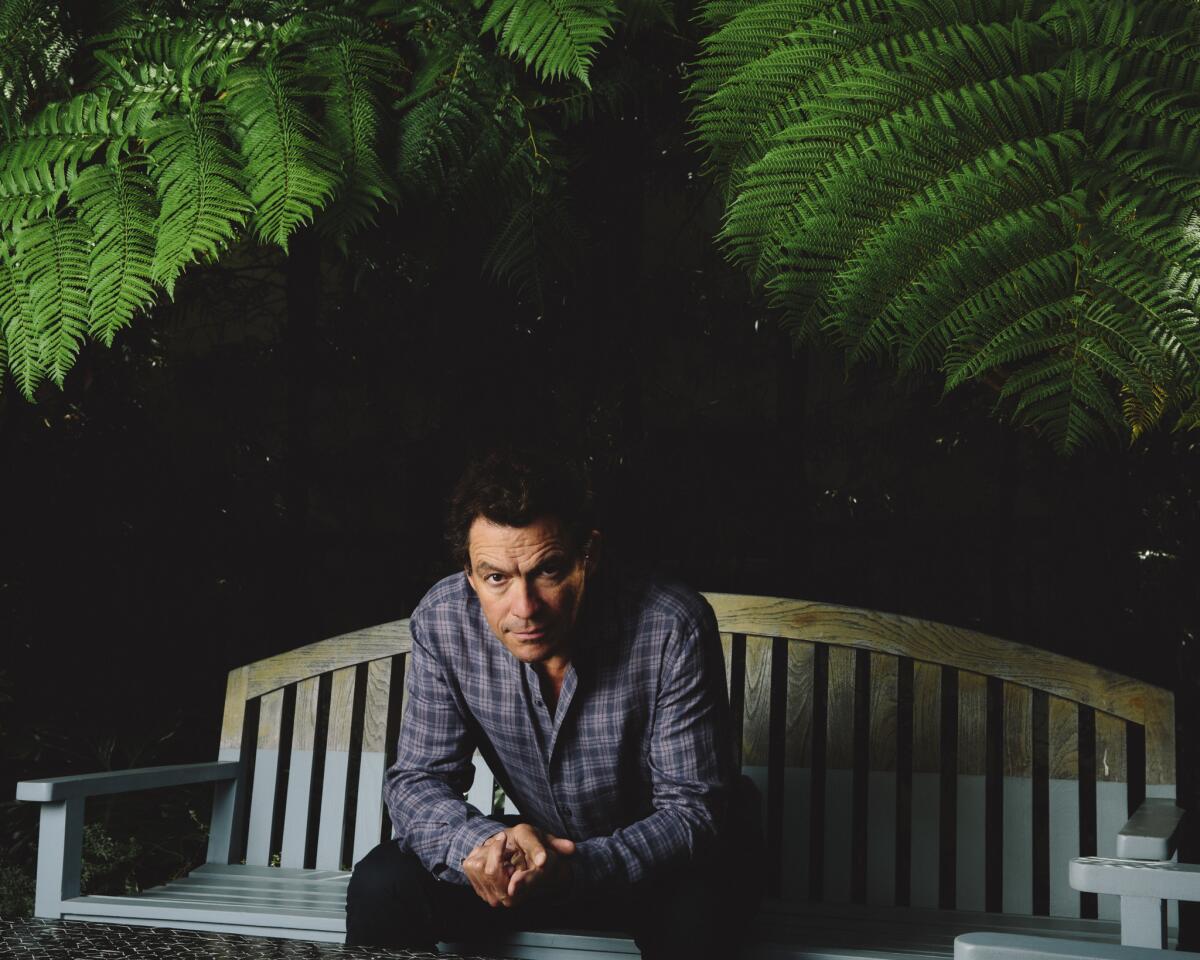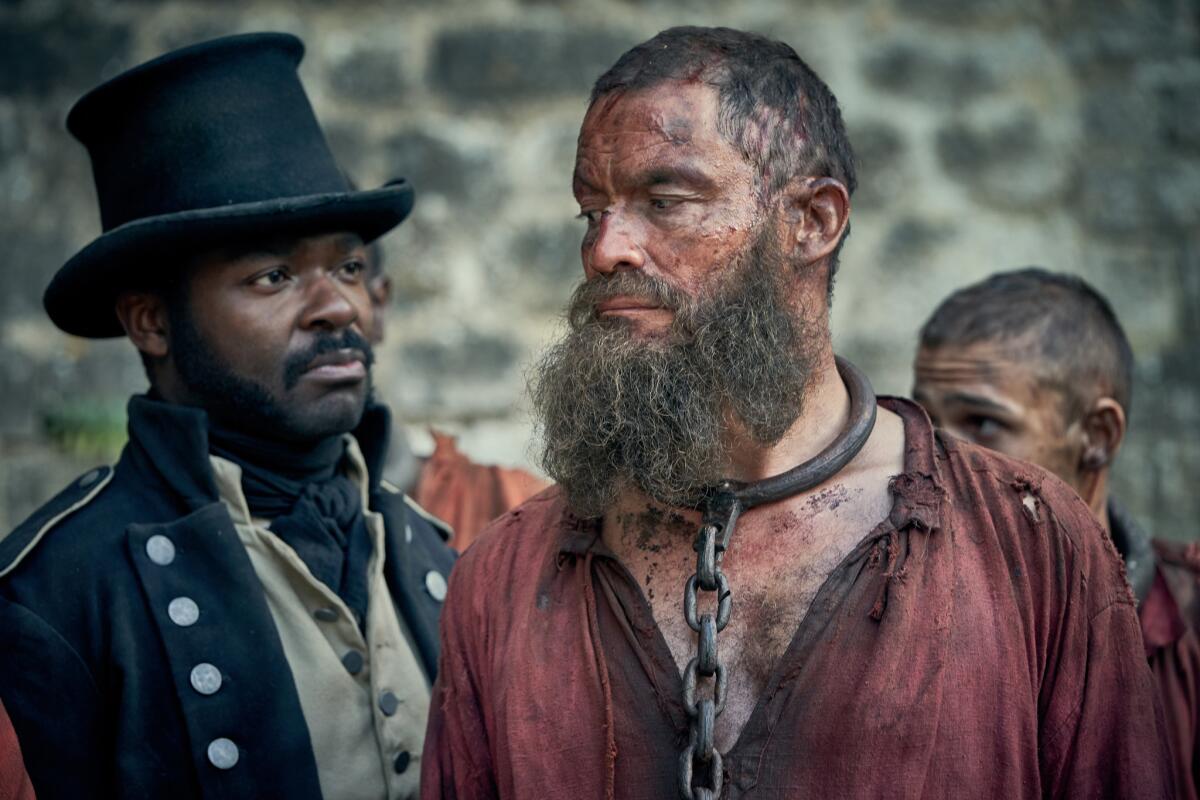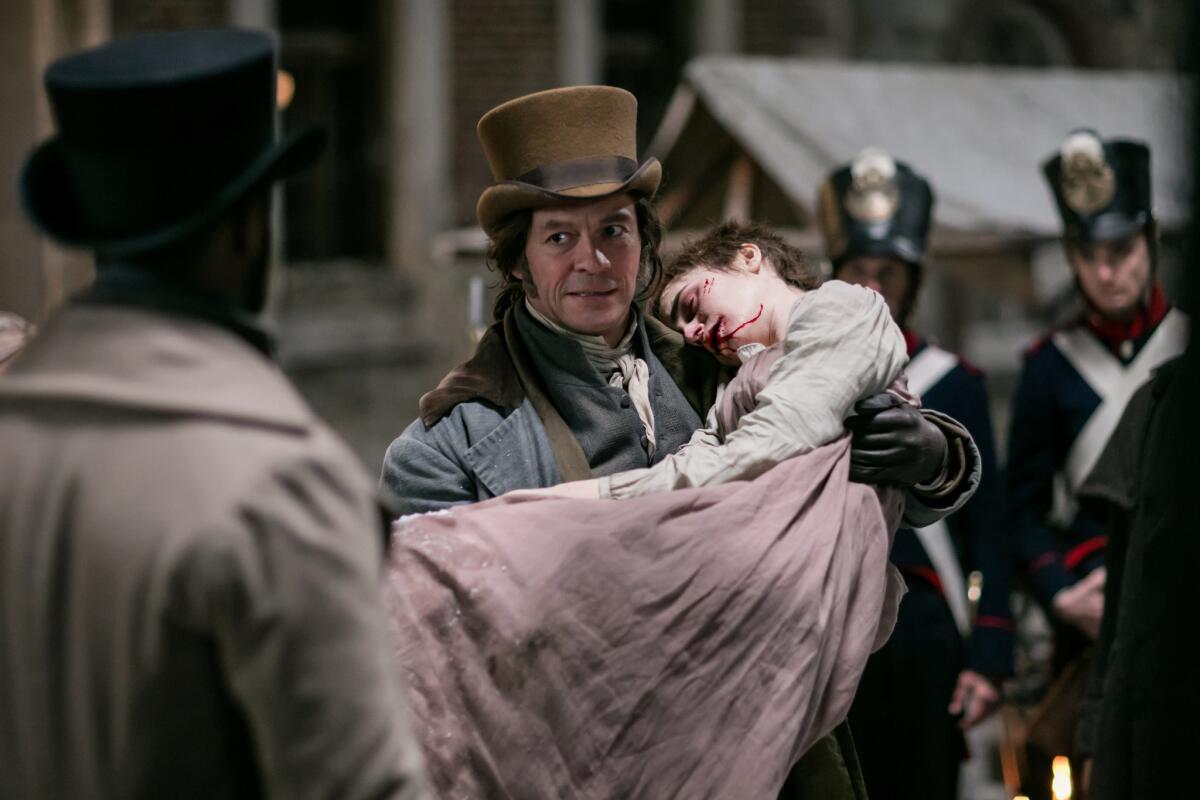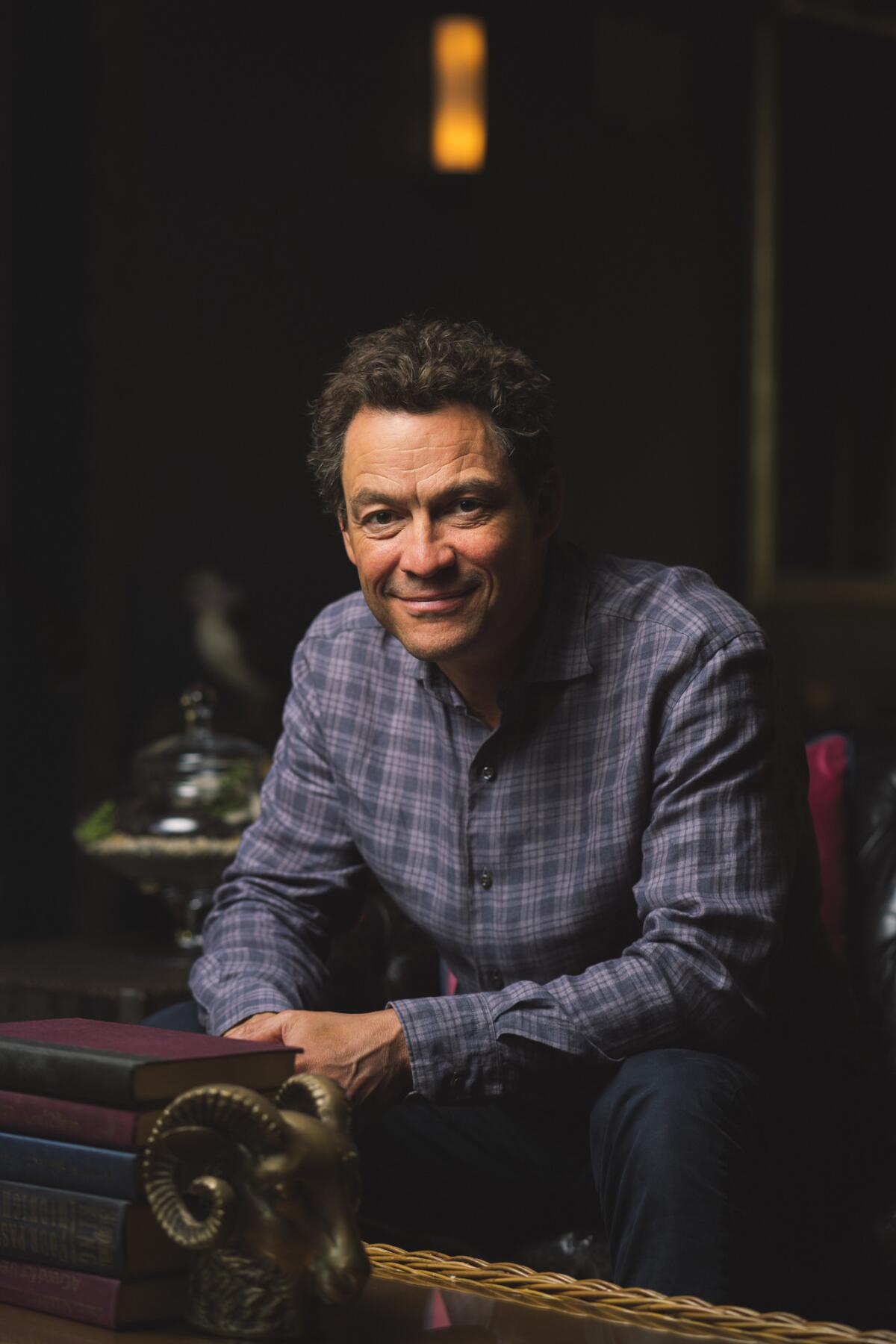Dominic West on the near-erotic bond between Valjean and Javert in ‘Les Miserables’

- Share via
Since the original publication of Victor Hugo’s novel “Les Miserables” more than 150 years ago, the brutal conflict between the convict-turned-savior Jean Valjean and ruthless pursuer Inspector Javert has been dramatized countless times on stage, screen and even radio.
Although most of the versions have been dramatic, the most dominant and popular adaptation of the 1862 novel is musical. The Tony Award-winning “Les Miserables,” launched in Paris in 1980, has been featured on stages around the globe, and its colorful characters, luscious ballads and rousing anthems have been embraced by millions of theatergoers.
Dominic West is not among them.

There’s an almost erotic bond between Valjean and Javert. Javert is nuts about him.
— Dominic West
The actor who came to prominence in the landmark HBO series “The Wire” and is starring in Showtime’s “The Affair,” has never seen “Les Miserables” on stage. And he didn’t make it all the way through the 2012 film version starring Hugh Jackman and Russell Crowe.
Still, he understood how immensely popular the musical is. Which is one reason he had doubts about taking on the role when he was approached about playing Jean Valjean in a new dramatic six-hour adaptation of “Les Miserables.”
“I thought, ‘What’s the point?’ ” West said as he sat in the front courtyard of a boutique hotel in Santa Monica recently. “They’ve made a very successful film, and the stage musical is so successful. Then I read the script, and I realized there was a lot more to it. In living memory there’s been no six-hour version, no long-form version of the novel. The story you’re familiar with and the characters you’re familiar with are seen in greater depth.”
The miniseries, which debuts April 14 on PBS’ “Masterpiece,” also stars David Oyelowo (“Selma”) as Javert, Lily Collins (“Rules Don’t Apply”) as the doomed seamstress Fantine and recent Oscar winner Olivia Colman (“The Favourite”) as the abusive innkeeper Lady Thenardier. Andrew Davies, who has written adaptations of everything from “Pride and Prejudice” and “Bleak House” to “House of Cards” and “Bridget Jones’s Diary,” adapted Hugo’s novel for the project, which was co-produced by “Masterpiece” with BBC Studios.
The bleakness and brutality of Hugo’s vision is vividly depicted, alerting viewers immediately that there will be no catchy songs or light moments in this “Les Miserables.” “Masterpiece” executive producer Rebecca Eaton said there are compelling differences that should appeal to fans of the musical and devotees of Hugo’s work.
“The musical is great, the songs are great, but sometimes it covers up the story,” Eaton said in a phone interview. “What we’ve done is the narrative, with all its intricacies and subtleties that you just don’t get in the musical. We’re going much deeper. I love how Andrew humanizes and animates these 19th century tomes. He really went for the highs and the lows, and is making a political statement about poverty and class.”
The depiction of the virginal Fantine’s fall into degradation and prostitution, for example, is explored in chilling and horrifying detail. One of the highlights of the musical is “Master of the House,” a comic ode to the crooked operation of the inn run by the Thenardiers; in the “Masterpiece” version, the couple is much more menacing and manipulative.
And viewers who remember West as detective Jimmy McNulty from “The Wire” or are used to seeing him in various states of undress and in steamy sex scenes in “The Affair” may be startled when he is introduced as Prisoner 24601. He is almost unrecognizable, shorn of almost all his hair (“They cut my hair off with a knife and fork”) and wearing a lengthy and unkempt beard.
ALSO: 10 years after ‘The Wire,’ cast members reflect on their careers after the classic series »
But it’s his performance, along with Oyelowo’s, that is at the center of this “Les Miserables,” and Eaton maintained that viewers will be captivated by how the two actors play out the life-and-death battle between Valjean and Javert: “To watch these two is just mesmerizing, My weakness is actors, and when I’m in the presence of great actors, it’s just wonderful.”
Among the most prominent film adaptations was a 1935 Oscar-nominated film starring Frederic March, a 1998 film starring Liam Neeson and Geoffrey Rush, and a 2000 French miniseries starring Gerard Depardieu and John Malkovich.
West became a believer in this latest version after reading Davies’ adaptation, and Hugo’s novel.
“Reading the book was the most pleasurable reading experience I’ve ever had,” he said. “I think it’s the best book ever written. It’s even greater than Tolstoy. Valjean is the greatest hero in literature. His story of redemption and the battle he has against his adversaries and against himself make him such a compelling hero.”
As Valjean, West had to connect with both his brutal side and his tenderness: “He’s been imprisoned for 19 years for stealing a loaf of bread to feed his starving nieces and nephews,” he said. “He knew when he went to prison that they would all die in starvation.”
He added, “What’s central to the book is Javert’s view of the criminal, which is they are born and cannot be redeemed, and Hugo’s more enlightened view, that you’re a product of the way people treat you. If you’re brutalized for 19 years, you will be a brute. His evolution from violent brute to pillar of the community and then romantic hero is what’s so extraordinary about his character arc. Behind this beast is this great compassionate soul.”

I think it’s the best book ever written. It’s even greater than Tolstoy. Valjean is the greatest hero in literature.
— Dominic West on Victor Hugo’s “Les Miserables”
Then there’s the core of “Les Miserables” — the clash between Valjean and Javert.
“There’s an almost erotic bond between Valjean and Javert,” West said. “Javert is nuts about him. We kind of hint at it. In these things, you always look for the strongest impulse, and that’s always sex and love.”
However, there was not much love between West and Oyelowo during the shoot.
“I kept trying to get to know David; I kept asking him out to dinner, and he was very aloof,” West said with a laugh. “I thought, ‘Boy, is he unfriendly! He’s a bit snooty.’ And then at the end, we finally went out — it was his birthday — and we had this great night. I said, ‘Wow, we should have done this months ago,’ and he said, ‘No, no, I was deliberately avoiding you.’ It was very clever. You do have a rapport with someone you hang out with on a set, and he didn’t want to have that. He was bloody right.”

ALSO: Dominic West and Ruth Wilson of ‘The Affair’ lighten up for a chat »
He laughed again. “He has everything I lack. He has immense discipline, whereas I’m incapable of not wanting someone to be my friend. He’s perfectly able for the benefit of the work to keep his distance. I admire him hugely as a person and as an actor.”
Both he and Oyelowo are executive producers of “Les Miserables.” “I had never done it before,” West said. “David was good at it. He’d watch stuff and come out with useful notes the next day. I had a lot of opinions about the production until we got into the shoot. Then the only notes I had was, ‘Could you hold on me a little longer? I think you’re missing a bit of magic.’ ” He burst into a loud laugh. “Of course they ignored me.”
West credits his role in “The Affair” with being a crucial tool in helping him prepare for “Les Miserables.” The Showtime drama, which explores the impact of an extramarital affair from different perspectives, is in the midst of filming its fifth and final season.
“There was never a light moment on ‘The Affair,’ “ he said. “It was always emotionally expensive stuff. Lots of grief and emotion. It taught me a lot. I don’t think I could have done Valjean without being on that show.”
Even then, it took time for West to understand Valjean. “What I found so difficult to understand is why he surrenders himself to Javert. Why does he feel he’s a bad guy when all he did was steal a loaf of bread? That took me a very long time, to realize what sort of psychology Hugo was anatomizing there,” West said. “He’s been so brutalized, told that he’s an animal for 20 years. He believes he’s not worthy of love, he believes he’s not worthy of living in normal society, he believes the only thing he deserves is the brutal life of the prison.”
As happy as he is with “Les Miserables,” West is also coming to grips with wrapping up “The Affair.” which also stars Maura Tierney and, until last season’s plot twist, Ruth Wilson. ”Five years is a long time for television, and I’m ready to move on, for sure.”
Although he is looking forward to new projects, he is also constantly reminded of his past — particularly “The Wire” which has only gained in reputation since its original five-season run, which started in 2002. The multilayered series about the narcotics scene in Baltimore is regarded as one of the most significant and compelling dramas in recent TV history.
“It’s really extraordinary how it’s grown in stature, and I feel very lucky to have been involved,” West said. “People always come up to me and say they’ve just watched it. If it came out now, I think it would have been lost in the sheer volume of great projects. But in some way, it can be said it catalyzed this golden age of television and to have raised the bar. For me, it’s been the gift that keeps on giving.”
More to Read
The complete guide to home viewing
Get Screen Gab for everything about the TV shows and streaming movies everyone’s talking about.
You may occasionally receive promotional content from the Los Angeles Times.







